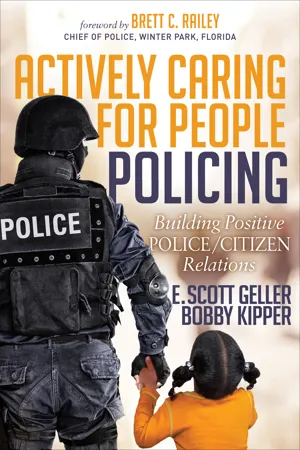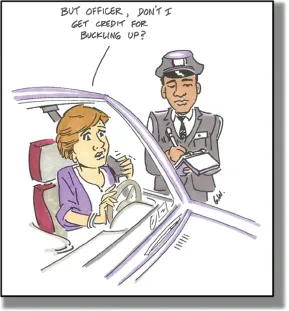![]()
|
|
Lesson 1
Employ More Positive Consequences
|
First, realize that behavior is motivated by consequences. As Dale Carnegie, author of the seminal book: How to Win Friends and Influence People, said in 1936, “Every act you have ever performed since the day you were born was performed because you wanted something.”6 We do what we do because of the consequences we expect to get, or escape, or avoid by doing it.
Your own experience or common sense informs you of this fundamental principle from behavioral science. Question: Would you rather be influenced by positive consequences or negative consequences? Your personal experience and common sense provide the answer to this question, and it’s verified by over 60 years of behavioral research.
What is your reaction to the illustration on the next page?
Does the scenario seem silly, inappropriate, or ill-advised? Could you imagine a police officer actually giving a motorist a reduced fine for speeding if s/he is buckled up? What might be a driver’s reaction to receiving such a positive consequence in this situation?
In what ways could this simple and practical addition to the enforcement of compliance to speed limits influence the attitudes and behaviors of vehicle drivers and occupants?
The most efficient and effective way to improve both behavior and attitude at the same time is to follow desirable behavior with a positive consequence. In fact, what happens to one’s attitude when undesirable behavior is followed by a negative consequence? We all know the answer to this rhetorical question, right? But if we realize the attitudinal and behavioral advantages of using positive rather than negative consequences to influence behavior, why are negative consequences used more often than positive consequences to improve behavior at home, in organizations, and throughout communities?
Please record your answers to this question here and then participate in a group discussion about answers, if possible.
A Matter of Mindset
Note how the answers reflect this very principle: Behavior change techniques that are most convenient and rewarded with immediate impact are most popular, at least over the short term. But discuss answers to this question: Which behavior-change technique will have the longest-term beneficial impact? Why?
Often, the same situation can be viewed as: a) control by penalizing unwanted behavior, or b) control by rewarding desired behavior. Some students in Professor Geller’s university classes, for example, are motivated to avoid failure (i.e., a poor grade); while other students are motivated to achieve success (e.g., a good grade or increased knowledge).
Which students feel more empowered and in control of their class grade? Which ones have a better attitude toward the class? Of course, you know the answers. Reflect on your own feelings or attitude in similar situations where you perceived your behavior was influenced by either positive or negative consequences.
Figure 1 on the next page depicts four distinct achievement-related states that have been researched by behavioral scientists to explain differences in people’s attitude and motivation when working to achieve success versus avoid failure.
It’s most desirable to be a success seeker. These are the optimists who respond to setbacks in a positive and adaptive manner. They are self-confident and willing to accept challenges, as opposed to evading demanding tasks to avoid failure. They wake up each day to an opportunity clock rather than an alarm clock. It’s a mindset or attitude toward life you can influence in yourself and others with situational manipulations and communication, both interpersonal and intrapersonal (i.e., self-talk).
Figure 1. Motivational typologies defined by achieving success vs. avoiding failure
Failure avoiders have a low expectancy for success and a high fear of failure. They do whatever it takes to protect themselves from appearing incompetent. They often set low expectations and use defensive pessimism to shield themselves from experiencing failure. These individuals are motivated but are not “happy campers”. They are the students who say, “I’ve got to go to class; it’s a requirement,” rather than, “I get to go to class; it’s an opportunity”.
Discussion Question: What kinds of conversations do you have with others and to yourself that influence a success-seeking over a failure-avoiding mindset, and vice versa?
Bottom line: Applying soon, certain and positive consequences is the most effective way to improve behavior and attitude at the same time. Using this life lesson on a daily basis is both critical and challenging. Why? Because we seem to live in a “click-it-or-ticket” culture that relies on negative consequences to manage behavior, from the classroom and workplace to our homes, and during our travel in between. Indeed, the government approach to behavior management is to pass a law and enforce it. Who are the visible enforcement agents of our society?
Discussion Questions: Given the law-enforcement responsibility of police officers, what attitudes and emotions are typically associated with police officers?
Share experiences of perceived positive and negative attitudes or emotions connected to the police officer’s uniform and vehicle. What kinds of positive consequences could turn this around?
![]()
| Lesson 2 Benefit from Observational Learning. | |
If you want to be better at what you do, watch someone who performs that behavior better than you. Of course, we all realize the power of observational learning. Indeed, a large body of psychological research indicates this type of learning is involved to some degree in almost everything we do.7
Our actions influence others to a greater extent than we realize. Children learn by watching us at home, and our colleagues are influenced by our actions at work. We’re often unaware of such influence. Consider what children learn by watching the driving behavior of their parents, including their parent’s verbal behavior.
As depicted in the illustration on the next page, most parents don’t realize the dramatic influence of their behavior on their children’s actions. The poem below illustrates the power of observational learning.
The eye’s a better teacher and more willing than the ear;
Fine counsel is confusing, but example’s always clear;
And the best of all the preachers are the ones who live their creeds.
For to see the good in action is what everybody needs.
I can soon learn how to do it if you’ll let me see it done;
I can watch your hands in action,
but your tongue too fast may run;
And the lectures you deliver may be very wise and true.
But I’d rather get my lesson by watching what you do.
For I may not understand you and the high advice you give.
There’s no misunderstanding how you act and how you live.
—Forrest H. Kirkpatrick
The Public View of Police
Consid...




